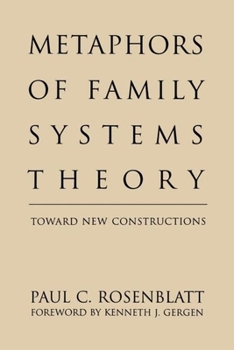Metaphors of Family Systems Theory: Toward New Constructions
Select Format
Select Condition 
Book Overview
This innovative book probes the language of family systems theory, demonstrating how metaphors shape our understanding both of families themselves and of the goals and process of therapy. The author shows how a deeper understanding of standard theoretical metaphors--and the development of alternatives--can help clinicians and students identify hidden assumptions, incorporate perspectives that may otherwise have been overlooked, and forge creative...
Format:Paperback
Language:English
ISBN:1572301724
ISBN13:9781572301726
Release Date:February 1997
Publisher:Guilford Publications
Length:239 Pages
Weight:0.80 lbs.
Dimensions:0.7" x 6.0" x 9.0"
Customer Reviews
1 rating
A bridge for shifting from systems therapy to postmodern narrative approaches
Published by Thriftbooks.com User , 17 years ago
The last reviewer missed the whole point. This book is about "family systems theory," not about "metaphors." The author traces the historical development of family systems theory which is the cornerstone of the revolutionary family thherapy paradigms developed in the 50s and flourished in the 70s and 80s. Howerver, paradigms do change. A newer and more radical "narrative" paradigm is replacing the old family systems framework that is gradually dominating the family therapy field. Anyone interested can go read White & Epston's "Narrative Means to Therapeutic Ends" (1990, W. W. Norton) for details. The Rosenblatt's book was written in mid 90s, and the field then was just starting to embrace the narrative approaches. This book took on the seldom taken step to trace and re-examine the theoretical background that governed the family therapy field, and found several distinguishable "metaphors" (or more clearly to say "dominant discourses") that lie behind the writings of early family therapy gurus. Though not a easy read, this book provides a bridge and reflective space for those start to criticize the hegemony of family therapy movement. The readers are advised to have some preliminary understanding of family therapy and systems concepts in advance. Though the author is not obviously favorable to narrative therapy in the writings, he has provided a important stepping stone for those who want to shift from systems thinking to narrative thinking. Contrary to the last reviewer, I think this book should stay on all die-hard family systems therapists's bookshelves!






